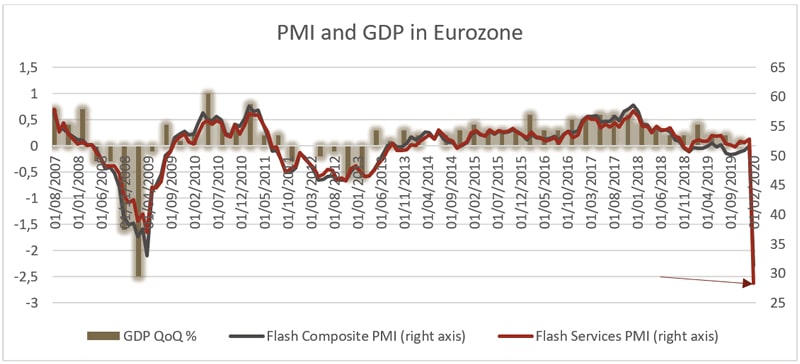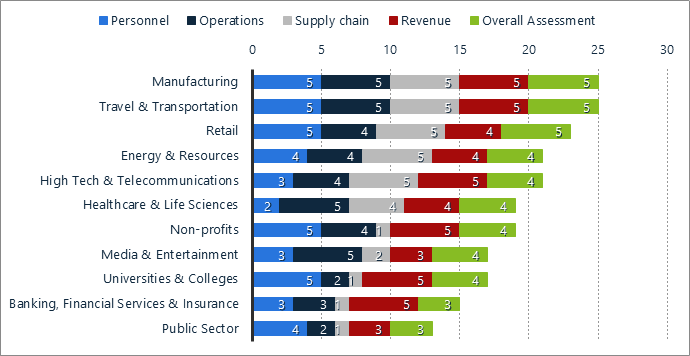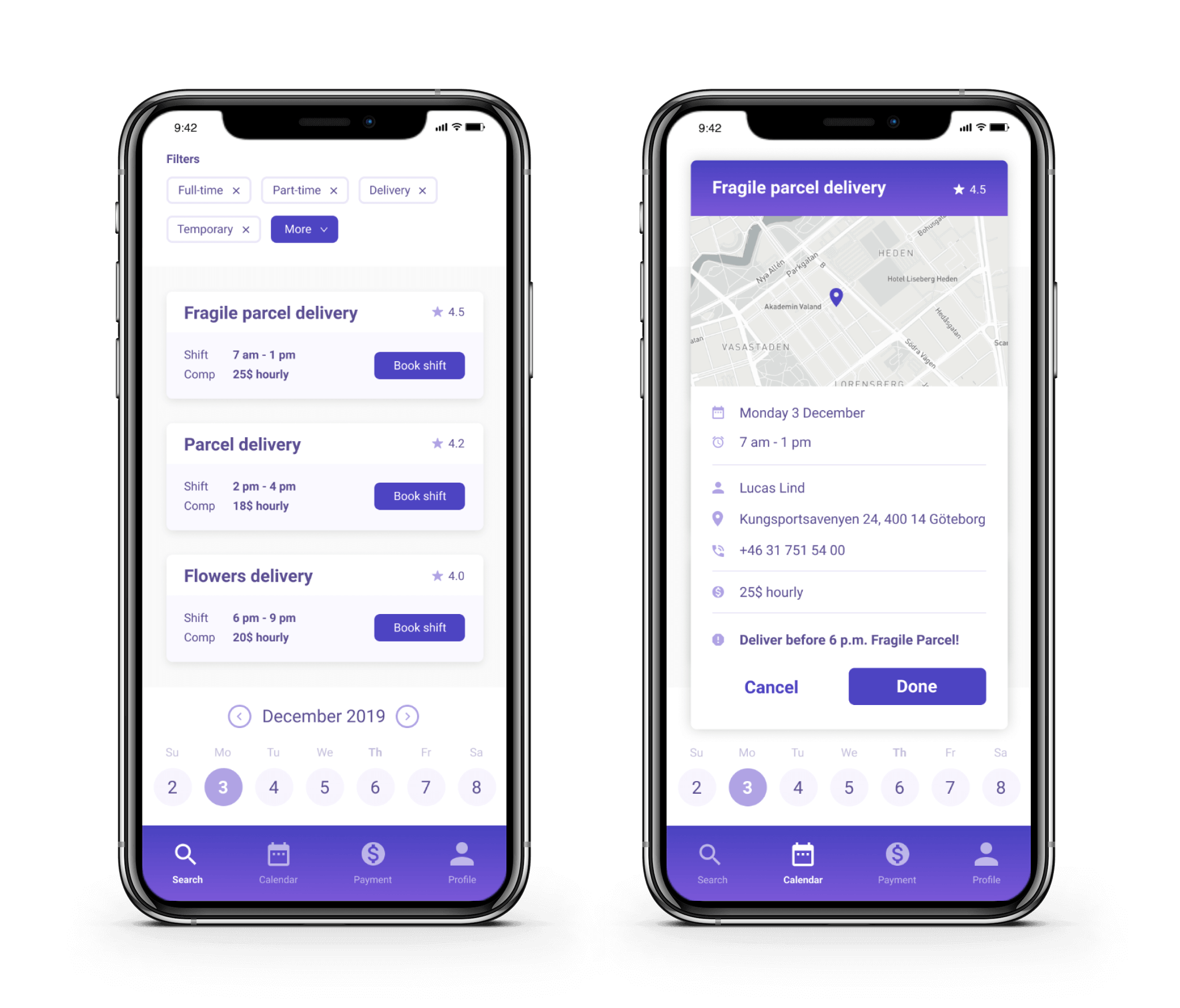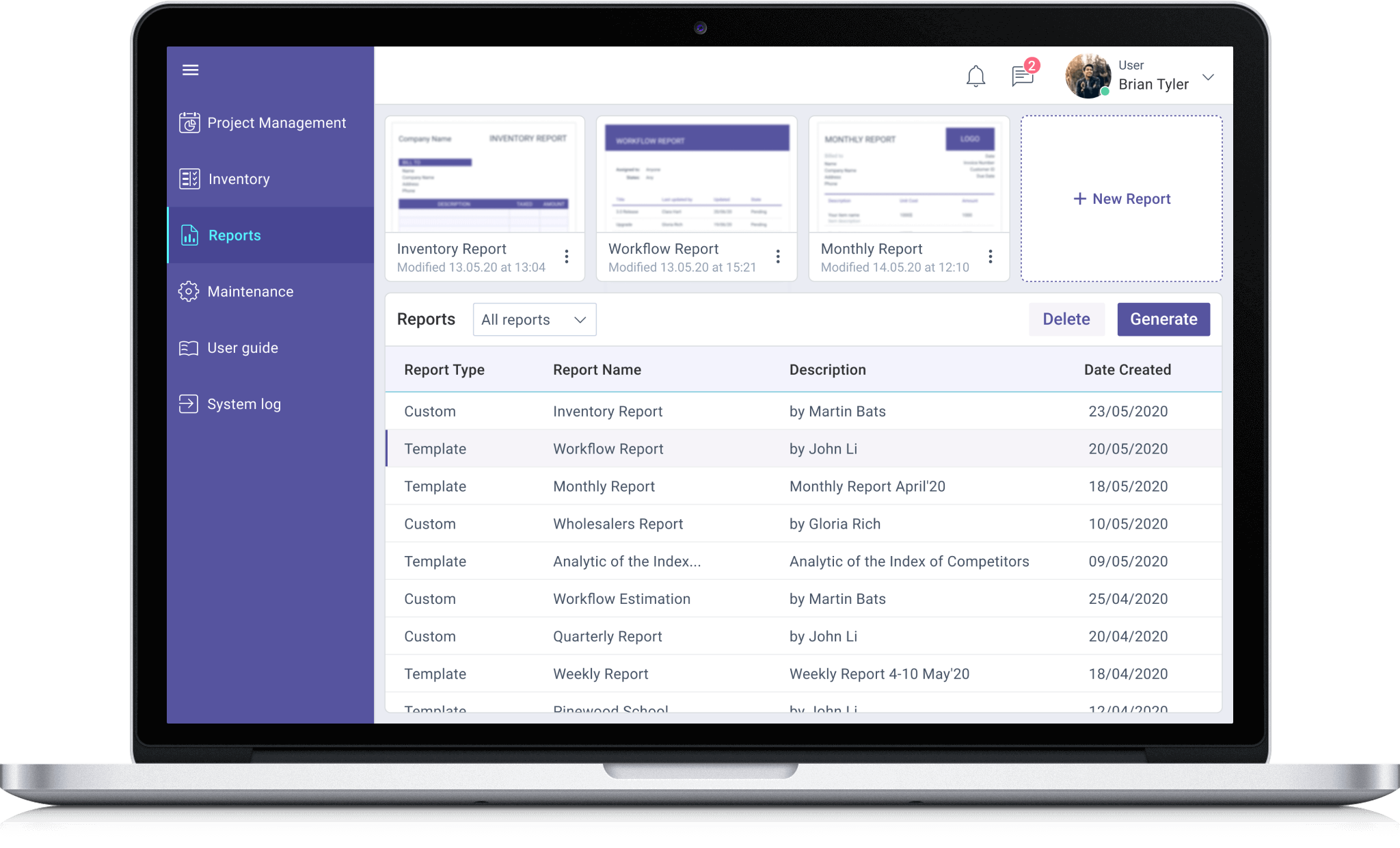The consequences of the humanitarian crisis caused by the coronavirus outbreak are evolving daily. As a result, businesses face new challenges which overcoming is crucial to continue serving customers around the globe. The pandemic has dramatically changed the business environment for the service industry, especially for such sectors as tourism, hospitality, and retail.
According to the survey conducted by the United Nations Conference on Trade and Development, in the eurozone the Purchasing Managers Index (PMI) indicator, a measure of prevailing economic trends, in services and the composite PMI both contracted from above 50 points in January to minus 28.4 and minus 31.4 respectively by mid-March:

Further deterioration caused by the necessity of social distancing and lockdown measures adopted by governments, most probably, won’t improve the situation in the foreseeable future. Projected COVID-19 impact index by industry and dimension in 2020 (minor (1) to severe (5)) provided by Statista allows detecting the industries that will suffer the most:

In such a situation, for companies that work in the service industry, the need to revise the approach to handling daily tasks arises. In this article, we’ll consider which new challenges businesses have to deal with today, and how adopting an ERP system can help deal with coronavirus-era issues.
Facing the New Business Reality
As you might guess, the current state of affairs is pretty challenging, primarily for industries that rely on in-person interactions. Despite advances in digitization and mass transfer of operations online, such sectors as banking, insurance, hospitality, retail, and many others will be significantly affected by coronavirus consequences.
The need for following such protective measures as physical distancing, reduction of nonessential operations, and a limited number of person-to-person interactions raises new challenges regarding reaching new customers and meeting their requirements. Even those companies that have actively invested in the adoption of software solutions may find themselves faced with limited robustness due to dependence on paper-based processes or lack of tools required for the hassle-free transition to work-from-home mode.
Facing the coronavirus crisis, people change their lifestyle, which, from the business point of view, may lead to shifts in customer demand both in terms of consumption volumes and suddenness. Such changes may force companies to rush to reorient in order to match the sharp changes in the market. Implementing business processes review while keeping efficiency high may be a pretty harsh task. Considering the possibility of the second wave of coronavirus, businesses should prepare for a significantly different next normal. Companies should build resilience in their operations, adopt efficient tools for evaluating how their demands could evolve, and develop plans with flexibility and agility.
In addition to difficulties in communicating with clients, forced restrictions on person-to-person activities can also affect everyday workforce activities. The list may include such things as performance management, employee training, hiring, and so on. The revised approach to the activities management would more likely imply redesigning the regular cadences of the day, week, and month. Rethinking how your staff members will work together, how their performance is measured, and how you can maintain employee engagement will also become an important requirement. The approach to hiring new employees should also be redesigned in order to minimize personal contacts as much as possible.
Summing up everything that was said, companies should start to reassess their processes to minimize contact among customers and staff members. Adopting this new approach to operating models will require looking critically at end-to-end processes to mitigate risks in improving overall effectiveness under changing market conditions.
How ERP Solutions Can Help Service Industry
In this chapter, we’ll discuss what benefits an ERP system can provide. It’s essential to keep in mind that for companies that work in the service industry, ready-made EPR systems designed for manufacturing organizations may be considered as pretty complicated and even cumbersome due to their overload with functionality. As an alternative, you can always choose a light version of the ERP solution that includes only those functional modules that your company needs.
First of all, during the coronavirus outbreak, it’s essential to focus on your staff safety and ensure its efficiency during multiple changes in business processes. Relying on manual processes to manage your employees can make this task barely solvable. Adopting a reliable Employee Management System can be an excellent way to reduce the likelihood of human errors and avoid compliance risks. Such systems offer solutions that help to increase employee engagement and ultimately impact retention. Performance management tools provide an effective way of tracking and evaluating employee development, which allows assessing the correctness of decisions made.
Facing harmful consequences of the crisis, we all go through may not only harm your business as a whole but also cause depressive mood among employees. In such a case, a tool that will make your workers feel valuable will be irreplaceable. An employee management system helps you connect with your employees personally and get feedback over various business policies and processes. If your business relies on delivery, some of your employees may feel unsafe due to the need for physical contact with a large number of clients. The ability to discuss precautions used and suggest ways to improve them will help your staff members to feel that their opinions are valued and taken into account. This, in turn, will improve employee engagement.
During the lockdown, many restaurants and cafes have shifted focus to delivery, which led to the need for an urgent expansion of the food delivery staff. It is an excellent example of a situation when you may need a reliable tool for automating and managing organization’s recruiting and staffing operations.

Recruitment Management System can provide you with dozens of features that can improve the recruitment process. Let’s consider some of them. Resume management tools allow uploading, parsing, and searching for resumes instantly. You can quickly generate your own resume format according to what type of specialists you currently need. You can increase the visibility of your current vacancies by sourcing multiple channels. For example, you can allow potential job applicants to apply directly from the social networks they use. If you think that you find the people you want to hire, use a scheduling tool integrated with the calendar that your company uses, be it a Google calendar, or a custom-made solution.
Read Also A Good Time for a Startup to Build a Food Delivery App
As pandemic pushes on, online sales grow 76% in June. Therefore, if you work in retail, you probably want to ensure that your warehouse is up and running no matter what. A Warehouse Management System can help you to automate a vast number of daily tasks. The absence of required goods on your warehouse and your inability to get them in a short time can make your clients choose one of your competitors. A warehouse management system can analyze the flow of goods and show you a list of items that are currently in high demand. With this information before your eyes, you can decide when it’s time to purchase from your suppliers. Furthermore, you can set the number of specific goods that must always be in stock. In case of shortages, the system can automatically inform you via email or mobile notification.
Read Also How Advanced Warehousing Can Help Your Business Overcome Long-term Crisis
The flow of paper documents within the organization during the coronavirus outbreak may become a pretty serious issue as it can negate all attempts to reduce personal contacts between employees. The digitalization of documentation can help you to solve this issue and also optimize the workflow. For example, your delivery staff members can use their smartphones or tablets with installed custom-made mobile apps to get electronic signatures from clients. This data will be automatically downloaded to your ERP system that provides centralized access for all your employees. Your software system can also handle customer invoicing and payroll.

ERP systems can help you to take advantage of reporting and dashboards. Since some of your employees most probably work from home, and you make everything possible to reduce the number of personal interactions, regular meetings intended to assess the current success of your business may no longer be part of your daily routine. In such a case, dashboards and reporting tools built into ERP solutions can help you manage remote reporting. They can also be customized to help teams manage unexpected costs, new ledger items, and financial closes.
Conclusion
To overcome concerns brought by the situation we all have to deal with, companies must adapt to the new business environment as fast as possible. Some changes made to the usual business processes will be temporary, and some of them will become a natural part of your business in the future. The adoption of ERP solutions built following the requirements designed to reduce personal contact between employees can improve your business’ safety, improve its efficiency, and prepare you for rapidly changing market conditions.
If you want to find a software solution to your business problems but don’t know where to start, you can always contact us and discuss any issue you have with our specialists.